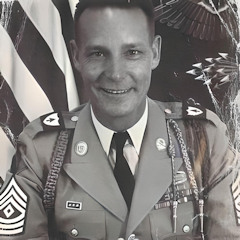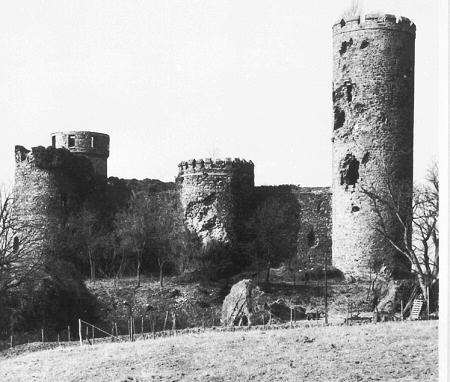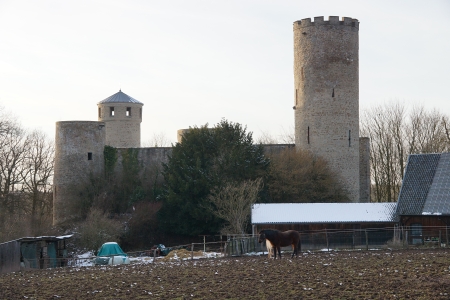I Company, 16th Regiment of the 1st Infantry Division

Excerpt of an oral interview with Ben Franklin by the University of Tennessee Knoxville
 My regiment went around to the east of Aachen just like we did Paris. The regiment, the division had a very stable way of doing things. Number one, we always attack at three o'clock in the morning. Number two, if there's a cutoff problem, the Sixteenth always went around. So my regiment went around and cut the town off and blocked it from any reinforcements coming from any others. So my regiment went to the east of Aachen to block the German Army from coming in to reinforce. The Eighteenth went from the south end, and the Twenty-Sixth went directly into Aachen. And that was the tactics.
My regiment went around to the east of Aachen just like we did Paris. The regiment, the division had a very stable way of doing things. Number one, we always attack at three o'clock in the morning. Number two, if there's a cutoff problem, the Sixteenth always went around. So my regiment went around and cut the town off and blocked it from any reinforcements coming from any others. So my regiment went to the east of Aachen to block the German Army from coming in to reinforce. The Eighteenth went from the south end, and the Twenty-Sixth went directly into Aachen. And that was the tactics.
Of course, being a young soldier, I was not aware of the overall strategic ... goal, but I knew we were .... in the east part of Aachen because — I later saw a map of a place called Crucifix Hill, which the Eighteenth Infantry was attacking, and we were east of it, and my machine guns poured in. My particular section of guns poured in twenty-five boxes of ammunition on Crucifix Hill, you know. And the reason I remember this is we had to pull the tracers. See you had two regular rounds, one armor person, and one tracer in a belt. Then it's, again, two, one, and one. And we had to pull the tracers out because we were firing and we didn't want the counter-fire to find us. And all of us wore blisters on our hands pulling the tracers out and pushing in a regular round. And we fired at the Crucifix Hill very, very effective. We got no counter-fire.
We run down in the basement of a house, of an apartment building right down in the basement — nobody fired back at us. And we stayed there ... oh a few days. Most of October, latter part of September, and most of October we stayed in that area. We just had one platoon in that basement. And then one platoon of machine guns wasnormally thirty-six men, thirty-six to forty-four. But then we were cut down in strength. We had about eighteen or nineteen people in the platoon because we had casualties and no replacements, see? And the reason is because in machine guns you don't need as many replacements as you do in a rifle platoon. Rifle platoons were cutdown from forty-two men down to, sometimes, eight or ten people, and particularly in I Company,the company we were always attached to. So we stayed there, and it was not ... really difficult.
And then when Aachen fell, we jumped off toward what was called "The Advance Towards the Roer", that's the Roer River. Of which, I was not familiar with that, but I just later learned that we were trying to reach the Roer River. We had to go and take the Roer and cross it. Well, on the way we had to go through Stolberg and then we ended up in the Hurtgen Forest.
Now the Hurtgen Forest is ... it's an unexplainable mistake of the American General staff, not to be questioned by simple soldiers. We simply obeyed orders and organized — four divisions took part in the ... area of the Hurtgen Forest. In the Hurtgen Forest, we had 35,000 casualties out of four divisions. Well, if you figure the average division normally has 14,000 to 16,000 men in it, but after they've been on the line for six months like we had been, we were reduced down to a division, maybe 10,000 a division. So out of 40,000 or 45,000 troops that participated in the Hurtgen Forest, we had 33,000 casualties. So that — you can readily see the impact casualty wise of the Hurtgen Forest.
Now why? One, there were no roads through the Hurtgen Forest, there were simply fire trails. Two, the trees were located — it was so dense so close together that you could not even drive a Jeep between them. So everything was on foot and you had to carry everything, and the weather was miserable. It rained constantly. I don't remember not raining. I don't remember ever being dry on any part of my body in the over thirty days I was in the Hurtgen Forest. The artillery would come in — course the German had registered the artillery particularly on the fire trails, and we tried to use tanks a couple of times and M-10s, a tank destroyer on these fire trails, but the Germans would lock them and knock them out, you know. They couldn't maneuver. They couldn't — they just had to just stay on the path there. So they saw their futility of that, how stupid it was so, they quit that. And it ended up that we had to fight viciously for yards. To advance fifty yards in two days was quite an accomplishment.
The Hurtgen Forest was perhaps twenty-five, I don't know, twenty-five or thirty miles deep. I remember that we came to a town called Hamich and I did see a map from the platoon leader, platoon sergeant at that time, and there was a castle just beyond Hamich. The castle dominated everything around it. And it was our objective, along with I Company, to take it. And it was vicious to take it, absolutely vicious.

Laufenburg Castle in 1962

Laufenburg Castle (2013)
But we had hopes if we can take this castle, we will get inside and we'll get out of the rain and we'll get warm and we'll be able to heat up some C-rations and we will be able to have a little — maybe even wash our balls, you know. Where ... I hate to say this, but the truth of the matter is, you don't wash your balls for thirty or forty days, they get ... filthy and they burn and they itch, and it's an unpleasant thing. I hate to reduce the ... element of war to that level, but it's, that's a fact.
So we had hopes of doing it. And after perhaps a week of fighting, vicious fighting, we finally took the castle. I remember distinctly a man named Lieutenant Wolf was with, at that time, he was with K Company, and K Company came to relieve us. And I later met Lieutenant Wolf as a colonel out in California at a reunion, and he remembered exactly this — course he acted as though he remembered me, I'm sure he didn't. But I remembered him because he was in charge, and he told us we had to get out because F Company is moving in. We just took the damn thing and hour before then, you know. So we had to get out and go up on the hill. F Company moved — or K Company moved in and took over the castle. Then he told me that night battalion came up and run him out and battalion headquarters took over the castle. But I remember the castle at the town of Hamich and to me that's the outstanding memory of the Hurtgen Forest.

~~~ Ben Franklin ~~~
Jan. 19, 1925 - † Jan. 19, 2012

Source: The University of Tennessee Knoxville Veterans Oral History
